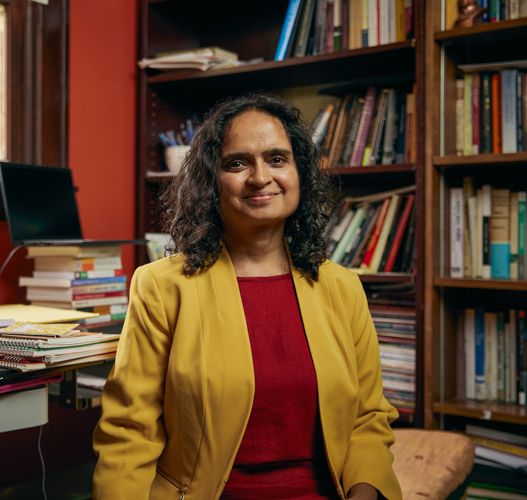Shailaja Paik wins $800,000 MacArthur “genius grant”

Shailaja Paik
Indian American historian Shailaja Paik is among the 22 winners of the prestigious 2024 MacArthur Fellowships, who will each get what is known as a “genius grant” of $800,000 over five years to spend however they want.
The no-strings-attached grant is given to “individuals who have shown exceptional creativity in their work and the promise to do more,” according to an announcement from the John D. and Catherine T. MacArthur Foundation Tuesday.
Paik, currently a professor at the the University of Cincinnati, is a historian of modern India exploring the intersection of caste, gender, and sexuality through the lives of Dalit (“Untouchable”) women.
She provides new insight into the history of caste domination and traces the ways in which gender and sexuality are used to deny Dalit women dignity and personhood, according to the Foundation.
“Centering the most oppressed Dalit women provides a more comprehensive understanding of oppression, dehumanization, and injustice and revitalizes anti-caste, anti-patriarchal, and anti-race work,” she says.
“I contribute to new global histories of our collective humanity, by illuminating the ways Dalit women resist and display resilience and agency—they stand up again and again; they continue to get up and out from the under.”
Across her work, Paik centers Dalit perspectives. In addition to English, Marathi, and Hindi-language source materials, she is creating a new archive comprised of her interviews and fieldwork with contemporary Dalit women.
Paik’s first book, Dalit Women’s Education in Modern India: Double Discrimination(2014), details Dalit women’s struggles for education and agency in colonial and contemporary urban Maharashtra.
Drawing on oral interviews with three generations of women, she shows that Dalit women were caught between two opposing forces. Anti-caste reformers and radicals pushed education as a means of caste liberation, but a society committed to patriarchal, Brahminical ideals offered limited education and employment opportunities for women.
Paik expands upon the tensions between the state, anti-caste reformers, and Dalit women and their own agency in her most recent book, The Vulgarity of Caste: Dalits, Sexuality, and Humanity in Modern India (2022).
In this project, Paik focuses on the lives of women performers of Tamasha, a popular form of bawdy folk theater that has been practiced predominantly by Dalits in Maharashtra for centuries.
For many Dalit women, Tamasha is a tradition and livelihood passed down through several generations. Paik outlines how caste reinforces notions of sex and gender, such that Tamasha is viewed as a form of sexualized labor and Dalit Tamasha women are indelibly branded as ashlil, or vulgar. Despite the state’s efforts to reframe Tamasha as an honorable and quintessentially Marathi cultural practice, ashlil sticks to Dalit Tamasha women.
Paik also critiques the narrative of Dr. B.R. Ambedkar, the twentieth century’s most influential caste abolitionist. Ambedkar places responsibility on Dalit women to uplift themselves through the rejection of sexualized performance, even if doing so causes great hardship.
Paik’s analysis of hitherto neglected Marathi historical documents and oral histories shows that, in spite of this double bind, Dalit Tamasha women strategically make use of public performance.
They leverage Tamasha for economic ends, to resist patriarchal notions of ashlil, and to attain manuski (human dignity) on their own terms. Through her focus on the multifaceted experiences of Dalit women, Paik elucidates the enduring nature of caste discrimination and the forces that perpetuate untouchability.
Paik received a BA (1994) and MA (1996) from the University of Pune and a PhD (2007) from the University of Warwick. She served as a visiting assistant professor of history at Union College (2008–2010) and a postdoctoral associate and visiting assistant professor of South Asian history at Yale University (2012–2013).
Since 2010, Paik has been affiliated with the University of Cincinnati, where she is currently the Charles Phelps Taft Distinguished Research Professor of History and affiliate faculty in Women’s, Gender, and Sexuality Studies and Asian Studies.
She has published articles in the Journal of South Asian Studies, Gender and History, Journal of Women’s History, and Indian Journal of Gender Studies, among others.
“The 2024 MacArthur Fellows pursue rigorous inquiry with aspiration and purpose. They expose biases built into emerging technologies and social systems and fill critical gaps in the knowledge of cycles that sustain life on Earth,” said Marlies Carruth Director, MacArthur Fellows
“Their work highlights our shared humanity, centering the agency of disabled people, the humor and histories of Indigenous communities, the emotional lives of adolescents, and perspectives of rural Americans.”
